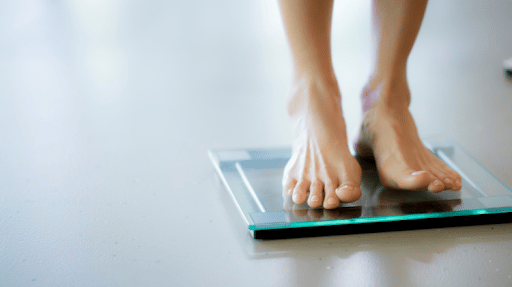When weight gain seems uncontrollable, losing weight begins to be more challenging. Thus, many pressure themselves, and excessively engage in diet and exercise. For some, the results are quicker, but for others, it takes a longer period before results become highly noticeable. However, are you really doing things correctly?
Also, as you aim to bring back your normal weight, some questions may even arise such as “how much weight can I lose in a month?”. In this article, not only that you will learn how much weight you can lose, but you will also know how to sustain a healthy weight.
How To Lose Weight In A Month?
As you begin doing exercise or having a balanced diet, you will automatically experience a decrease in your body weight. However, results might be boosted if you try these tips.
Set Realistic Goal
Obviously, weight loss is the primary goal, however, it is too broad, and at first, you should be specific and realistic about what you want. For instance, it is good if you can specifically define how much weight you want to lose in a week or month. After specifying, you should ensure that it is realistic.
You cannot say that you should lose fifty pounds in a month right away. A rapid weight loss may seem effective at the surface, but it may negatively affect your overall health. Instead, set the goal to lose weight in the range of 1-2 pounds per week or around eight pounds per month for your own health.
Change Your Diet
If you are serious about achieving significant weight loss, you must adopt a healthier lifestyle. Hence, there should be certain adjustments in your diet: consider limiting your calorie intake. According to research, weight gain is common in people who do not have a calorie deficit.
A calorie deficit is a phenomenon wherein you consume fewer calories than what your body burns. So, how many calories do you consume per day? Of course, calorie consumption is not entirely bad, and you cannot cut it all to zero as it is your source of energy. However, you can also get some healthy calories from eating protein-rich foods and other nutrient-dense foods such as whole grains rather than having lots of sugary foods.
This approach also works with low-carb diets. For example, as you eat nutrient-dense foods along with your high-protein breakfast, your cravings for other foods will be reduced. This also applies to eating fiber-rich foods.
A healthy diet does not only help you lose weight, it also offers other health benefits such as keeping muscle mass from lean protein. So, to further help you with calorie restriction and a low-calorie diet, it is also suggested to avoid certain drinks such as soft drinks and commercial juices in the same way you avoid eating processed foods as they contain liquid calories. HealthCanal, a health website, provided much information on such matters as well.
If you really want to lose weight, you can also search for different healthy recipes on the internet. You can even incorporate some fermented foods or vegan probiotic supplements to help your body release extra calories from what you consume during a meal. Mindful eating is also suggested to be effective, especially if you are in the adjustment period. It may involve eating slowly, which helps you prevent eating more than you would want to. Lastly, calorie counting may also help, together with having a food journal to clearly monitor all your food intake.
Exercise Is Important
Exercise is always recommended regardless of whether you want to boost weight loss or not. It is another way to lose weight as the body burns more fat during physical activity. Furthermore, this reduces the likelihood of rebound weight gain, especially if you pair it with a healthy diet.
Exercise may depend on your body needs and your weight loss goals. However, some examples include aerobic exercise, lifting weights, and other resistance training. If you lift weights, the muscles built from proteins your intake may become leaner. Meanwhile, some people like athletes are engaging in high-intensity interval training for more sustainable weight.
Aside from the fat loss, being physically active also protects you from different health conditions such as unbalanced blood pressure, blood sugar, and cognitive decline.
Use Additional Support
While the above tips lead to lower body weight, extra practices may contribute to further weight loss. One thing that some people recommend is the use of fat-burning supplements. There is a wide range of products that contain top-quality ingredients that naturally help the body burn calories and fats. Its calorie-burning capability, however, needs proper usage and will not work without healthy eating habits.
There are various types of weight loss supplements available on the market, and dietary fiber has never been excluded from the list. Like vegetable-rich fiber, these supplements may make you full for a longer period, preventing you from craving unhealthy foods just to satisfy the need for energy intake.
How Much Weight Can You Lose In One Month?
Based on the statement from the Centers for Disease Control and Prevention (CDC), we can typically lose up to eight pounds per month. However, there are some that can lose nearly ten pounds in a month. Depending on the body’s capability to lose fat and extra calories, few people can reach the goal of up to twelve pounds.
Tips To Maintain Your Weight Loss
Here are two additional tips that will help you not only to lose more weight but also sustain it.
Take Measurements
Taking body measurements is a way to track your weight loss progress. Note that your progress does not have to be linear. The only goal of this is to be aware of your current body composition and help you know which area you should focus on at a current time.
Do Not Go Too Hard On Yourself
You do not have to lose all fats in your body right away. It is okay if you are losing weight at a gradual pace. Sometimes, it is even healthier.
You also do not have to be so strict in your diet to the point that your health will suffer. For instance, a low-fat diet is acceptable, but healthy fats contribute to better weight loss progress. Furthermore, avoid being too stressed as you need to have enough sleep. Sleep deprivation, according to research, is also linked to weight gain.
Lastly, drinking water is also necessary no matter how busy you are. Drinking water is helpful in digestion and helps your body burn more calories. As for intermittent fasting, there is some debate on how effective it is for weight loss. It is up to you if you still want to try it out, but it is always better to eat mindfully than cut down on food suddenly.
Conclusion
Are you still wondering how to lose ten pounds in a month? It is time to start with a weight loss diet. Eat food that is rich in essential nutrients and can help your body burn fat naturally, and apply other tips mentioned above.






